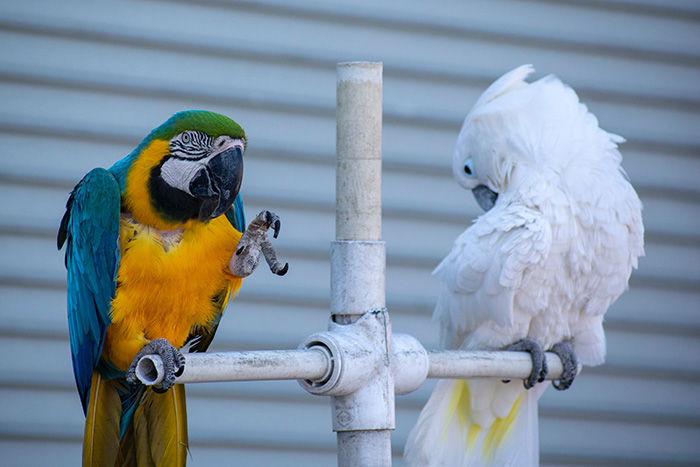Jump to Section
Over the past decade, birds have increased in popularity as pets. Parrots, in particular, are very popular as they can be hand-reared to become tame and entertaining companions.

Housing
Cages must be of an adequate size to allow the bird to extend its wings fully and to enable adequate exercise.
Care must be taken with brand new, cheaper cages which are often made from galvanized metal. The bird will often nibble at the galv balls (small beads of galv found on galvanised wire used in bird cages) which can lead to the potentially fatal zinc poisoning.
The perches that are supplied with most cages are usually plastic or wooden dowels which are too smooth and usually too small in diameter for the birds. This can lead to overgrown nails and skin problems. They are best replaced with natural branches from fruit trees.
Tame caged birds should be let out regularly into a safe enclosure to exercise to improve health and reduce boredom. Toys should be provided and changed regularly to help reduce boredom. Ensure that the toys are zinc free. Wing clipping is not recommended as it can lead to feather disorders and psychological problems.
Birds should not be housed in dusty areas as this can lead to respiratory disease. Tobacco smoke should also be avoided.
Diet
Poor or unbalanced diets lead to disease. Good quality commercial bird foods should be fed. The avian enthusiast should research the dietary needs of the particular species of bird.
Illness
Call us to book in!
Book your pet in for an appointment with one of our friendly, experienced vets today!
“The staff are so lovely”
★★★★★
The staff are so lovely to my cat and treat him like he is their own pet.
– Nicole, 5-Star Google Review
Opening Hours
Mon to Fri: 7:30am-7:00pm
Sat: 8:30am-1pm
Sun: Closed
